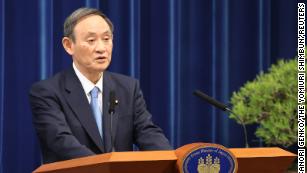Japan’s Prime Minister Yoshihide Suga has declared a state of emergency for the nation’s capital and surrounding areas as Covid-19 cases surge to the highest levels since the start of the pandemic.
The emergency declaration will be in place from Friday until February 2 and applies to Tokyo and the three neighboring prefectures of Chiba, Saitama and Kanagawa. The emergency includes a number of restrictions on daily life.
Suga has ordered companies to encourage their staff to work from home and reduce office populations by 70%.
Residents of the affected areas are also urged to avoid non-essential outings. The hospitality sector has been hit, with restaurants ordered to close by 8 p.m. and sporting events have been instructed to limit the amount of spectators present.
Suga said Thursday that the government will provide up to 1.8 million yen ($17,400) per month to each restaurant that complies with a request to shorten its operating hours.
Despite the raft of new measures, schools will remain open.
“There have been few cases of school infections spreading from schools to the community, and we would like to protect the learning opportunities of children who will lead the future,” Suga said Thursday at a press conference.
Japan’s leader stressed that the country still intends to hold the Tokyo Olympic and Paralympic games in July, despite the emergency.
“I am determined to hold safe and secure games by taking all possible measures against the infection,” Suga said.
Suga has been criticized for what has been perceived as his reluctance to take action to combat the spread of the virus, after the governor of Tokyo and the three neighboring prefectures urged him to issue an emergency declaration during a televised press conference last week.
Japan’s first state of emergency, declared last spring, relatively early in the pandemic, lasted more than a month, and saw schools and non-essential businesses closed.
The state of emergency comes as new Covid-19 cases and hospitalizations in Tokyo and the rest of the country, surge to their highest levels.
On Wednesday, Japan recorded 5,953 new Covid-19 infections — its highest daily caseload and the first time infections have surpassed the 5,000 mark — and 72 deaths. The national total has risen to 259,105, with at least 3,804 fatalities.

Prime Minister Yoshihide Suga is set to declare a state of emergency for the Tokyo metropolitan area.
The greater Tokyo region has been among the worst hit, surpassing 2,000 daily cases on Thursday for the first time with a record 2,447 new infections, according to updated figures from the Tokyo metropolitan government.
The number of seriously ill Covid-19 patients in need of hospitalization also continued to rise. In the capital, there were 121 patients in serious condition on Thursday with more than 3,000 receiving medical care in hospital.
Country-wide, the number of people in a serious condition rose by 13 on Wednesday to 784, with 41,054 people in hospital.
In a meeting with Japan’s health ministry on Wednesday, infectious disease experts called for immediate and strict measures to fight the outbreak.
“Looking at the number of newly infected people in the last week, Tokyo alone accounts for a quarter of the national total. The total number in the metropolitan area, including three other prefectures, accounts half of the total number of whole country. It is difficult to control the outbreak in rural areas unless we can curb the spread of virus in the metropolitan area immediately,” said Takaji Wakita, chief of the National Institute of Infectious Diseases after the meeting.
Others said the state of emergency would be insufficient to curb the infection rate by the end of the month.
“I predict it is not enough period to curb the infection surge, we need to reduce more the human contact,” said Satoshi Kamayachi, physician and one of the board members of the expert advisory board.
Hiroshi Nishiura, a professor at Kyoto University specializing in mathematical modeling for infectious diseases, told the meeting an emergency declaration would need to last take two months for the daily number of new infections to fall to manageable levels.
Japan confirmed its first cases of the new, potentially more infectious UK coronavirus variant two weeks ago, prompting the government to ban all foreign travelers from entering the country.
But cases throughout the country have been on the rise since the start of November thanks in part to cold winter weather and social distancing fatigue.
Suga dismissed calls to declare a state of emergency in November, citing advice from an advisory panel that hospitals were still relatively empty. However, Japan’s total case count has more than doubled since then.






